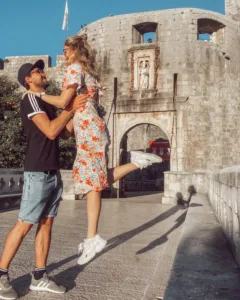
A Memorable Roadtrip in Croatia – From Dubrovnik to Plitvice Lakes
If you’re looking for a road trip that combines stunning scenery, rich history, and cultural experiences, look no further than Croatia. This charming country on

May to September
Zagreb
Euro (EUR)
Croatian
Croatia’s culture is a blend of ancient, Roman, Venetian and Mediterranean influences, but also strongly affected by the former Austrian monarchy and Yugoslavia. Most Croatians are Catholics.
You don’t need any special vaccionations to travel to Greece. If you stay longer a vaccination against hepatitis A & B and tick-borne encephalitis (TBE) may be to consider.
Croatia is part of the EU, so most Europeans don’t need visa and can travel freely in the Schengen-zone. Non-EU-citizens of many countries as the US, Kanada, Japan, Australia, New Zealand don’t need a visa for a stay shorter than 90 days.
Croatia in general is a very safe country. There are some pickpockets in the bigger cities like Zagreb and in touristy areas, in partricular at crowded places, e.g. on subways, at train stations or airports. Also, there are some car-break-ins, so don’t leave any valuables inside the car, especially don’t leave them visible in the car. Don’t sleep at the highway’s rest areas as there have been camper burglaries.
Unfortunately prices have increased in the past years, especially after Croatia’s EU accession in 2013. It is more expensive than other Eastern European states, but still cheaper than Western countries. High-season from June to mid-September is the most expensive time of the You wanna know what we spent in Croatia, click here. year when it comes to accomodation, entrance or parking fees.

If you’re looking for a road trip that combines stunning scenery, rich history, and cultural experiences, look no further than Croatia. This charming country on